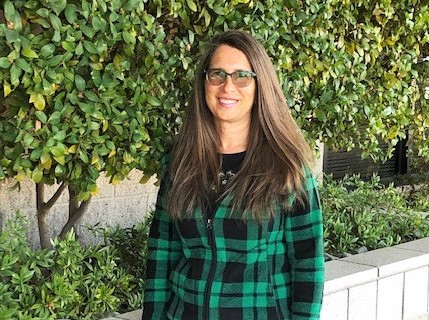
To recognize Social Work Month, Inside CDCR caught up with longtime parole Clinical Social Worker Deanna Stilwell. She began her career in 2007 as a contractor at California State Prison, Sacramento.
Just six months later, she became an employee with the Division of Adult Parole Operations working in the Auburn Parole Outpatient Clinic, as it was known then. While the name has since changed to Behavioral Health Reintegration, she’s still working in Auburn.
“I have been a Clinical Social Worker the whole time. Many people move around in CDCR doing different jobs at different locations. I have stayed put in Auburn with the same job the entire time,” she said.
Social work is geared toward reintegration
Since each paroled client is different, she’s able to put her skills to use helping them reintegrate into society.
‘No two days at the job are the same which keeps it interesting and challenging. The parole population has many challenges, and my job is about assisting those parolees who have needs in the behavioral health area. I make sure they have the support they need to be successful on parole and eventually discharge,” Stilwell said. “Being an Licensed Clinical Social Worker, I can work in a variety of capacities from providing therapy to case management. I work closely with my staff psychiatrist, Dr. Jaime Ortiz, who prescribes psychiatric medications for patients who need them.”
Receiving proper care
Helping those under parole supervision is what the job is all about.
“So many parolees with whom I work did not get identified as having mental illness until they were in jail or prison. Being identified and receiving proper care puts them on the right foot in approaching life both in and out of custody,” she said. “I have seen patients undergo treatment who can then better engage and connect with society. This then puts them on their way whether it be taking care of their family, going to work, or attending school. They have a reason to get moving when they wake up in the morning. They find meaning and purpose in their lives.”
Social work fills the gap between incarceration and parole. This requires social workers to wear many hats.
“The field of social work takes into consideration the unique interplay of factors which affect a person’s life. Those factors may help or hinder the parolee. As a social worker, it is perfectly reasonable, and often expected, to act in so many capacities whether it is providing therapy, being an advocate, or coordinating services,” Stilwell said.
‘Every individual has a unique story’
“People outside of corrections think the inmate and parolee populations are some monolithic group. I have found every individual has a unique story. They have the power to write their narrative and shape the outcome. About social work? ‘I could never do what you do’ is a common line I have heard throughout my 30 years in this field,” Stilwell said. “Yet, I cannot think of any work I would rather be doing. I enjoy making a difference in the lives of the people with whom I work. What led me to the field of social work was noticing how often people needed to be pointed in the right direction, connecting with resources or overcoming their own personal obstacles.”
‘No two days on the job are ever alike’ in social work
“What I think my work day will look like at the beginning versus how it looks at the end are usually quite different. I have appointments scheduled with parolees throughout any given workday. I also need to be available to see walk-ins. They may be individuals who were just released or have been difficult to locate,” she said.
Helping parolees in times of great need is part of the job. The entire team, ranging from parole agents to the psychiatrist, gets involved.
“For those in crisis, the BHR psychiatrist and I get care to them so they can avoid a trip to the hospital emergency room. I consult with parole agents and service providers in the community. I provide information for courts,” Stilwell said.
Stilwell has many examples of positively impacting someone’s life, but one is still fresh in her mind.
“Recently, a parolee of mine was going to court, and I offered to write a letter describing the services and his treatment in BHR. He entered the courtroom with the expectation that he may be heading directly into custody. Instead, the judge read my letter and allowed him to return home to his wife, toddler, and newborn baby,” she said. “Not only did I make a difference in one person’s life, but I made a difference for each member and that family as a whole.”
CDCR offers opportunities to learn and grow
“Working in CDCR has been a great career meeting lots of interesting people, whether it be my coworkers or clients. I enjoy the teamwork aspect of what I do, working together with all of my coworkers in CDCR to rehabilitate parolees and increasing public safety. The learning here and opportunities to grow and contribute never stops,” she said.
By Don Chaddock, Inside CDCR editor
See more stories highlighting CDCR/CCHCS staff.
Follow CDCR on YouTube, Facebook, X (formerly Twitter). Listen to the CDCR Unlocked podcast.